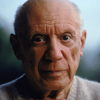Pablo Picasso

Pablo Picasso
Pablo Ruiz y Picasso, also known as Pablo Picasso, was a Spanish painter, sculptor, printmaker, ceramicist, stage designer, poet and playwright who spent most of his adult life in France. Regarded as one of the greatest and most influential artists of the 20th century, he is known for co-founding the Cubist movement, the invention of constructed sculpture, the co-invention of collage, and for the wide variety of styles that he helped develop and explore. Among his most famous works are...
NationalitySpanish
ProfessionPainter
Date of Birth25 October 1881
CityMalaga, Spain
CountrySpain
If you can imagine it...it is real
To me there is no past or future in my art. If a work of art cannot live always in the present it must not be considered at all. The art of the Greeks, of the Egyptians, of the great painters who lived in other times, is not an art of the past; perhaps it is more alive today than it ever was...
I want to create a cat like the real cats I see crossing the streets, not like those you see in houses. They have nothing in common. The cat of the streets has bristling fur. It runs like a fiend, and if it looks at you, you think it is going to jump in your face.
If I knew what the meaning of art was, I wouldn't tell you.
Even if the painting is green, well then! The 'subject' is the green. There is always a subject; it's a joke to suppress the subject, it's impossible.
The different styles I have been using in my art must not be seen as an evolution, or as steps towards an unknown ideal of painting. Everything I have ever made was made for the present and with the hope that it would always remain in the present.
No doubt, it is useful for an artist to know all the forms of art which have preceded or which accompany his. That is a sign of strength if it is a question of looking for a stimulus or recognizing mistakes he must avoid.
I see for others... in order to put on canvas the sudden apparitions which come to me.
I have never had time for the idea of searching. Whenever I wanted to express something, I did so without thinking of the past or the future.
I imitate everyone except myself.
I work with few colors, what creates the illusion of quantity is that they fell in the right place.
A plagiarist steals from one person. A true artist steals from everybody.
Painting isn't an aesthetic operation; it's a form of magic designed as mediator between this strange hostile world and us.
When you begin a picture you often make some pretty discoveries. You must be on guard against these. Destroy the thing, do it over several times. In each destroying of a beautiful discovery, the artist does not really suppress it, but rather condenses it, makes it more substantial. What comes out in the end is the result of discarded finds. Otherwise you become your own connoisseur.